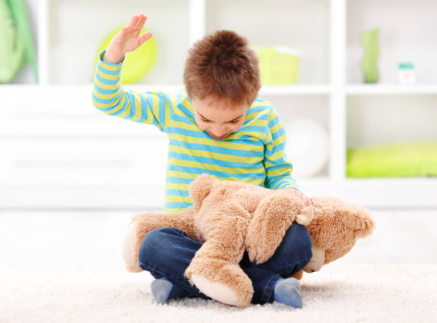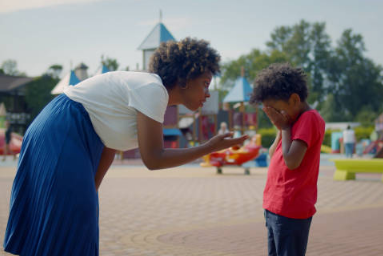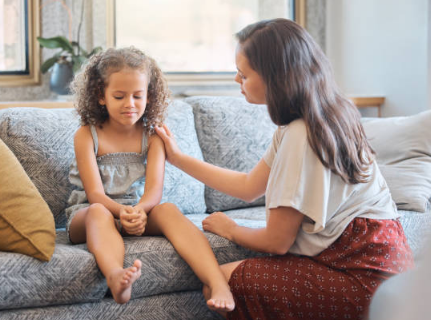There’s nothing like seeing your child spank another child to make you revisit your parenting skills. While this behavior may be humiliating, it doesn’t mean that your child will grow up to be a bully. “I refer to early childhood as a ‘critical stage’ in development because this behavior is common in children ages 1 to 2,” said Dr. Deborah Glasser, a clinical psychologist in Richmond, Virginia, and former president of the National Children’s Fund.
Here are some of the reasons for aggressive behavior, as well as advice from experts on how to stop your child from attacking other children.
Causes of Toddler Hits
Young children may not realize that hitting someone can hurt, in part because they don’t fully develop compassion until they are about three years old. Even if your child understands the idea, they may not be able to restrain themselves when they are with other children. They may not be able to fully understand their own emotions, let alone those of others, so it is unlikely that their actions are deliberately annoying others.
The reasons for hitting a toddler are simple and usually fall into one of the following categories.

They are trying to communicate
Like everyone else, young children can get bored, hungry, tired, and overwhelmed. The difference is that they lack the language skills to recognize and communicate these emotions, which can make them even more frustrated.
Miriam Schechter, MD, associate professor of pediatrics at Albert Einstein College of Medicine, said:”Because children’s vocabulary is not yet fully developed, they are more likely to use their bodies to express their feelings or fight back against dissenting opinions. “In the Bronx, New York.
They are defending their turf
You may have noticed that when your child is on the playground or playing, they play more often. This could be because there are other kids around them snatching their toys, pushing them down, or just invading their space, and they may not have heard your child yelling,”Stop! Or “Mine!” The anger or disappointment your child feels can be difficult for them to control.
They had a terrible day
When your child has a day off, they may lash out because they are grumpy and don’t have many coping skills. “Even children who don’t hit or bite regularly can lose control when they’re stressed or at the end of a long day,” Dr. Schechter said.
They are imitating others
Your child may have seen older siblings fighting with friends and wanted to do the same. “For some kids, there’s an element of trial and error,” says Jennifer Shu, an Atlanta-based pediatrician, MD, and a member of the American Academy of Pediatricians. “When they see another guy hitting someone, they think, ‘Well, let’s see how that feels.'” ”
They are naturally short-tempered
Some children are not very easy-going by nature and prefer to use their fists or teeth to guide them. “A lot depends on temperament,” explains Stanley Turecki, MD, a child psychiatrist and family psychiatrist and author of The Difficult Child. Some kids get out of trouble easily, while others get into Street Fighter mode.
They are trying new things
Young children keep asking themselves,”What will happen if I do this?” Dr. Theodore Dix, associate professor emeritus of human development and family sciences at the University of Texas at Austin, said that this is also reflected in their interactions with others. They don’t have the ability to get what they want in a reasonable way, so they may behave aggressively or be too provocative,” he explained.
They need their own space
Young children may not have a good grasp of spatial relationships. If they feel cornered by other children in a small area, they may try to hit (or scratch or bite) their way out.
10 Ways to Get Your Child To Stop Hitting People
Although young children don’t understand the effects of this behavior, it’s important to stop them from doing so. Here are some useful ways to get your child to stop hitting other kids.

Solve the hitting problem immediately
When your child is physically aggressive, address the behavior immediately:
- Lower their levels
- Look them in the eye
- Say in a calm, firm voice:”It’s okay to be angry/frustrated/upset; It’s not okay to hit someone.”
Here’s what you need: validate emotions (it’s okay to feel what they’re feeling) and keep boundaries (but it’s not okay to express their feelings through aggressive behavior). Young children tend to ignore longer explanations and can backfire as they may learn to equate aggression with getting attention. If they attack again, remove them from the scene. You can even hold their hand and say, “I’m not going to let you fight.” ”
“When you discipline your child every time you hit them, they will know that there is no excuse for violence,” Dr. Schechter said. ”
Find out why
Try to find out what upsets your child so much that they make them hit someone. Are they bothered that they can’t find a toy they like? Disturbed by someone in their space? Do they need snacks? Give them words to express their feelings. If they drop a glass of water off the table because they secretly want milk, help them convey that. You might say,”You want milk!” Say, ‘Milk’. ”
Be proactive
Make a note of which situations can cause your child to hit someone else and try to preemptively strike. Do they strike when they are tired or hungry, when they feel crowded, or when they have to leave a friend’s house? Elena Labrada, M.D., a child and adolescent psychiatrist in Menlo Park, Calif., says these are common triggers in children.
Avoid them with some pre-planning: Make sure your child naps regularly, have snacks ready, and be ready for the transition. Be creative when planning ahead too: For example, if they’re furious because they always want their playmate’s favorite toy, ask them if they can put the problematic toy away before their next play.
Try not to lose it
Some children believe that any attention is better than no attention. If you panic when your child does something wrong, they may be curious and motivated to take action to get a response.
Show empathy
When your child feels angry or frustrated, mark these emotions for them. You can say,”You look like you’re mad because Sam rides the yellow bus,” or “Are you upset because I won’t let you climb onto the coffee table?” Employing positive reinforcement (praising children when they share toys, or using gentle touch) can inspire better behavior.

Relate their actions to the feelings of others
Young children have limited understanding of how their actions affect others. Your child needs to understand how their friend feels when they get hit. “It hurt Sam and made him feel bad,” he said. Tell them you know they’re sad, but hitting someone is never the right thing to do.
Practice problem solving
Help your child learn to solve tricky situations through imagination games. Let’s say you’re a toddler, take their favorite toy, and teach your child how to respond (“That’s my toy, please give it back”). If that doesn’t work, tell your child to ask an adult for help. Perform these scenes often so that you can absorb the lessons.
Distract them
Ease the tension between the children by introducing another toy or game. Dr. Erin Floyd, a clinical child psychologist in Lilburne, Georgia, said, “Distracting a child with new activities is often the easiest way to resolve disputes. ”
If they are arguing over a toy, give them a minute to see if they can resolve the conflict first. If things start to escalate to hitting, say, “If you can’t take turns, I’ll put the toys away and we’ll try again later.” Don’t let your child keep the toys they forcibly snatched. By making them reciprocate, you let them know that roughness won’t get them what they want.
Monitor their media consumption
It’s important to be aware of everything your child watches (even cartoons) to make sure their shows don’t contain violence. Researchers have found that children who are exposed to violent images in the media are more likely to become aggressive.
Don’t hit your child
Experts say spanking is inappropriate, especially for one-year-olds. “At this age, your child is not developmentally able to connect you hitting [them], no matter how gently, to anything [they] may have done,” Dr. Turetzky said. If you want to respond to your child’s aggressive behavior with spanking, think about how confusing it can be when you’re told it’s okay to spank your child and then you’re being spanked as punishment.
While it can be worrying when your child hits someone, remember that there is usually no malice behind it. Your child’s intentions are good – they just need to learn Xi better way to express their feelings, and that will happen quickly. “Young children go through these stages for a month or two,” Dr. Tureki explains. “Anything ephemeral is usually nothing to worry about.”

